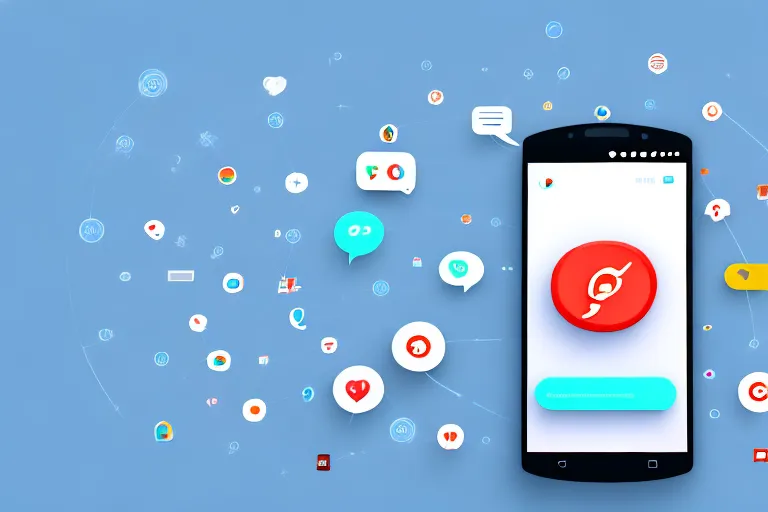The way we communicate has drastically changed over the years, and messaging has become an integral part of our daily lives. With the rise of smartphones, messaging apps have gained popularity, offering a convenient and efficient means of communication. But now, a new technology is on the horizon - Rich Communication Services (RCS) - which promises to revolutionize the messaging experience on Android devices.
Understanding RCS: The Future of Messaging
In order to grasp the impact of RCS on the future of messaging, it is essential to understand what RCS is and how it differs from traditional SMS (Short Message Service) and MMS (Multimedia Messaging Service). RCS, or Rich Communication Services, is an upgraded messaging protocol that enables more advanced communication features, such as read receipts, typing indicators, group chats, and the ability to send high-resolution photos and videos. It aims to provide a more interactive and seamless messaging experience.
RCS builds upon the foundation of SMS, which has been the standard for text messaging for decades. While SMS is limited to plain text and lacks many modern features, RCS takes messaging to the next level by incorporating multimedia capabilities and real-time communication enhancements.
One of the key benefits of RCS is its ability to bridge the gap between different messaging apps and platforms. Unlike traditional SMS, RCS messaging is not restricted to a specific carrier or device, making it a universal solution for Android users. This means that RCS allows users to enjoy a consistent messaging experience regardless of the messaging app they use or the device they are using it on.
Exploring the Features and Benefits of RCS
With RCS, users can enjoy a range of exciting features that enhance their messaging experience. The ability to see when the recipient is typing, along with read receipts, brings real-time communication to a whole new level. This feature alone can significantly improve the efficiency and speed of messaging, allowing for better coordination and seamless conversations.
Additionally, RCS allows users to send and receive high-quality photos and videos without compromising on resolution. Unlike traditional MMS, which often resizes media files, RCS ensures that the media content retains its original quality, leading to a more visually appealing messaging experience. Whether it's sharing breathtaking vacation photos or capturing memorable moments in high-definition videos, RCS enables users to express themselves in a more vivid and immersive way.
Furthermore, RCS enables group chats with multiple participants, offering a convenient platform for collaborative discussions among friends, family, or colleagues. The ability to create groups, add or remove participants, and share multimedia content in real-time adds a new dimension to messaging. Whether it's planning a surprise party, organizing a team project, or simply catching up with a group of friends, RCS makes it easier to stay connected and engaged.
Moreover, RCS introduces the concept of chatbots, which are automated programs designed to interact with users in a conversational manner. These chatbots can provide instant customer support, deliver personalized recommendations, and even assist with various tasks, such as making reservations or ordering food. By integrating chatbots into the messaging experience, RCS opens up a world of possibilities for businesses and individuals alike.
Another noteworthy feature of RCS is its support for rich cards, which are interactive elements that can be embedded within messages. These cards can display images, videos, buttons, and other interactive components, allowing users to interact with content without leaving the messaging app. For example, a restaurant can send a rich card with a menu, allowing customers to browse and place orders directly within the messaging conversation.
Furthermore, RCS offers enhanced security and privacy features compared to traditional SMS. With end-to-end encryption and secure authentication mechanisms, RCS ensures that messages and media content are protected from unauthorized access. This provides users with peace of mind knowing that their conversations and personal information are secure.
In conclusion, RCS represents the future of messaging by introducing advanced features, seamless cross-platform compatibility, and enhanced user experiences. With its ability to bridge the gap between different messaging apps and platforms, RCS offers a universal solution for Android users, revolutionizing the way we communicate and connect with others.
Evaluating the Impact of RCS: Is It Worth It?
While RCS brings a host of exciting features to the messaging landscape, it is important to evaluate its overall impact and whether it is worth adopting.
Rich Communication Services (RCS) is a next-generation messaging protocol that aims to revolutionize the way we communicate. With its advanced capabilities, RCS allows for a more engaging and interactive messaging experience, taking conversations to a whole new level.
One of the major advantages of adopting RCS is the enhanced communication it offers. With features like read receipts, typing indicators, and real-time responses, RCS enables users to have more meaningful and efficient conversations. It also allows for high-quality multimedia sharing, enabling users to send and receive photos, videos, and audio files without compromising on resolution.
Moreover, RCS bridges the gap between traditional SMS and over-the-top (OTT) messaging apps. It brings functionalities that were previously only available on third-party messaging apps, such as group chats, file sharing, and location sharing, directly to the default messaging app on your device. This eliminates the need for multiple messaging apps and simplifies the way we connect with others.
However, like any technology, RCS has its limitations. One of the drawbacks is its limited availability. Currently, not all carriers and devices support RCS, and this can create compatibility issues between users. While RCS is gaining traction globally, it may take some time before it becomes universally accessible.
Another consideration is the potential impact on data usage. While RCS aims to provide enhanced multimedia capabilities, sending high-resolution photos and videos may result in increased data consumption. It is important for users to be mindful of their data plans and adjust their usage accordingly. However, with the increasing availability of affordable data plans, this may not be a significant concern for many users.
Furthermore, adopting RCS may require users to update their messaging apps to access its full range of features. While this may seem like a minor inconvenience, it can be a barrier for users who are resistant to change or have limited access to app updates.
In conclusion, the decision to adopt RCS depends on various factors such as the availability of the service, the importance of advanced messaging features, and the user's data usage habits. While RCS offers exciting possibilities for communication, it is essential for users to weigh the pros and cons before making a decision. As RCS continues to evolve and become more widely supported, it has the potential to reshape the way we communicate and enhance our messaging experience.
Unveiling the Carriers and Apps Embracing RCS
Despite the challenges and limitations, the adoption of RCS (Rich Communication Services) is steadily gaining traction, revolutionizing the way we communicate. This advanced messaging technology offers a wide range of features and capabilities that go beyond traditional SMS. Let's take a closer look at the carriers and messaging apps that are embracing RCS and leading the way in this exciting development.
A Comprehensive List of RCS-Compatible Carriers and Apps
Major carriers such as Verizon, AT&T, and T-Mobile have recognized the potential of RCS and have already incorporated it into their messaging services. This means that Android users subscribed to these carriers can now enjoy the benefits of RCS without having to rely on third-party apps.
Verizon, one of the leading telecommunications companies in the United States, has been at the forefront of RCS adoption. With their advanced network infrastructure, Verizon has seamlessly integrated RCS into their messaging platform, allowing users to experience enhanced messaging capabilities such as read receipts, typing indicators, and high-quality media sharing.
AT&T, another major player in the telecommunications industry, has also embraced RCS to provide their customers with a more immersive messaging experience. By leveraging the power of RCS, AT&T users can enjoy features like group chats, file sharing, and even the ability to make video calls directly from their messaging app.
T-Mobile, known for its innovative approach to mobile communication, has not been left behind in the RCS revolution. With their commitment to providing cutting-edge services, T-Mobile has integrated RCS into their messaging platform, enabling users to enjoy features like rich media sharing, location sharing, and even the ability to send and receive money seamlessly within their conversations.
In addition to these carriers, popular messaging apps like Google Messages, Samsung Messages, and Android Messages have also fully embraced RCS. These apps offer a seamless transition to RCS messaging, ensuring a smooth user experience for millions of Android users worldwide.
Google Messages, the default messaging app on many Android devices, has been a strong advocate for RCS adoption. With its clean and intuitive interface, Google Messages allows users to take full advantage of RCS features such as read receipts, typing indicators, and the ability to send high-resolution photos and videos without compression.
Samsung Messages, the messaging app pre-installed on Samsung smartphones, has also integrated RCS into its platform. This means that Samsung users can enjoy a rich messaging experience, complete with features like group chats, reactions, and the ability to schedule messages for later delivery.
Android Messages, developed by Google, is another popular messaging app that fully supports RCS. With its cross-platform compatibility, Android Messages allows users to seamlessly communicate with friends and family, regardless of the device they are using. This app offers a wide range of features, including the ability to send and receive high-quality media, create chatbots, and even engage in interactive conversations with businesses.
As RCS continues to gain momentum, more carriers and messaging apps are expected to embrace this technology, further expanding its reach and impact. With its rich features and enhanced capabilities, RCS is poised to revolutionize the way we communicate, bringing us closer together in a more engaging and interactive way.
The Significance of RCS for Android Users
For Android users, RCS presents a significant advancement in the messaging landscape, as it brings a native messaging solution that is more on par with other popular messaging apps.
How RCS Enhances the Android Messaging Experience
RCS provides Android users with a consistent and feature-rich messaging experience across different devices and platforms. It eliminates the need for users to rely on third-party messaging apps to access advanced communication features, thus streamlining the messaging process.
Moreover, RCS offers a unified messaging experience by seamlessly integrating with other Android native features, such as contact syncing, call logs, and notifications. This integration fosters a more cohesive ecosystem within the Android platform, allowing users to effortlessly switch between different modes of communication.
In conclusion, RCS holds great potential to reshape the future of messaging on Android devices. Its advanced features and compatibility with major carriers and apps make it a compelling choice for users seeking a seamless and dynamic messaging experience. As RCS continues to evolve and gain widespread adoption, it is likely to become the standard protocol for messaging on Android, unlocking a new era of communication.

